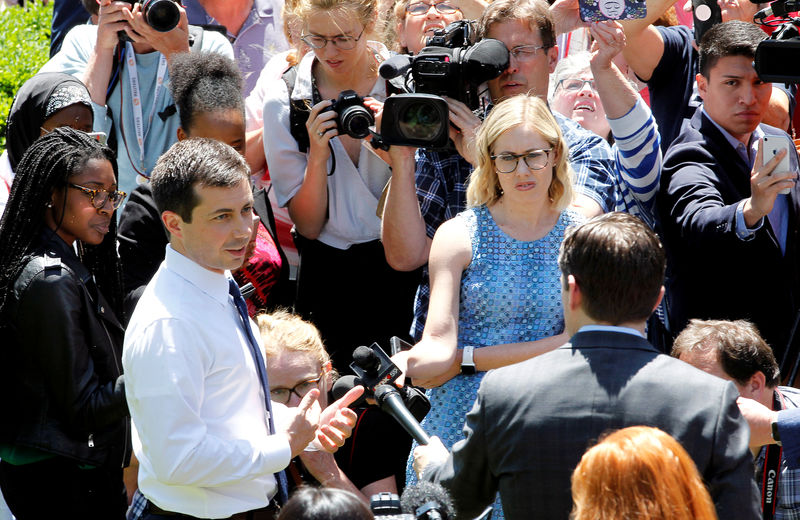By Doina Chiacu
WASHINGTON (Reuters) - Democratic presidential candidate Pete Buttigieg on Tuesday urged a stop to the "endless war" that followed the Sept. 11, 2001, attacks and a return to the Iran nuclear deal and Paris climate accord scrapped by Republican President Donald Trump.
Buttigieg, a Navy reservist who was deployed to Afghanistan, repudiated Trump's go-it-alone, America First approach to the world in the first foreign policy speech of his 2020 White House campaign. He outlined a policy based on "America at our best," a foil to Trump's "Make America Great Again" slogan.
"The need for a new foreign policy vision could not be more urgent today," Buttigieg said in Bloomington, Indiana. "This administration has embraced and emboldened autocrats, while alienating democracies and allies around the globe."
He told an audience at Indiana University that the next American president must set the bar high on the use of force, especially if Washington acts alone, and urged Congress to repeal a law passed days after Sept. 11 that paved the way for campaigns against al Qaeda and Taliban militants in Afghanistan.
"The world needs an America free from entrapment in endless war and prepared to focus on future threats," Buttigieg said. U.S. involvement in Afghanistan, for example, must come to an end, he said.
The mayor of South Bend, Indiana, Buttigieg is one of three military veterans running for president and, at 37, the youngest in a field of more than 20 Democrats. He is polling in a second tier of candidates behind the two front-runners, former Vice President Joe Biden and Senator Bernie Sanders of Vermont.
A Harvard University graduate and Rhodes Scholar who sprinkles French, Norwegian, Arabic and Italian in interviews, he is among the few Democratic candidates to issue a foreign policy agenda so far.
ABDICATION OF RESPONSIBILITY
Buttigieg said the 2001 Authorization for the Use of Military Force helped ensnare the United States in conflicts where the mission was not clearly defined and that Congress has abdicated its responsibility on waging war.
Republicans and Democrats have argued for years that Congress ceded too much authority to the White House after the Sept. 11 attacks. Divisions over how much control they should exert over the Pentagon have stymied efforts to pass a new law.
Buttigieg also vowed to return the United States to the landmark 2015 international Iran nuclear accord on the grounds the agreement was in the U.S. national security interest.
"Whatever its imperfections, this was perhaps as close to the real 'art of the deal' as diplomatic achievements get," Buttigieg said, referring to the title of a Trump book.
The United States needs to prioritize climate change as a national security issue and should rejoin the Paris climate accords limiting greenhouse gas emissions, he said.
Buttigieg criticized human rights abuses in China and the torture and execution of dissidents in Saudi Arabia, and took the view that people who support Israel can oppose the policies of its current right-wing government at the same time.

In another dig at Trump, who has generally fostered a close relationship with Russian President Vladimir Putin, Buttigieg called Moscow "a self-interested, disruptive and adversarial actor."